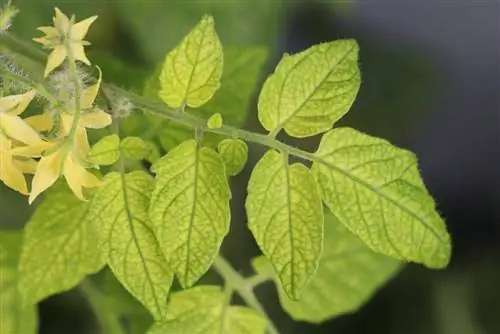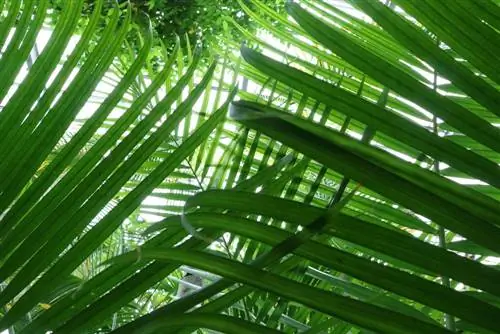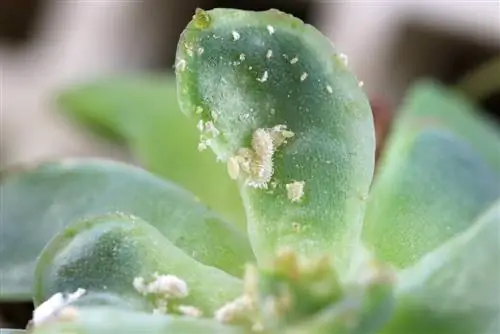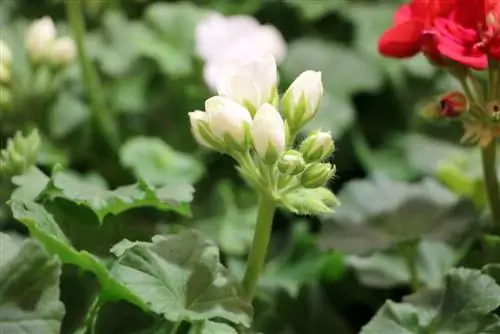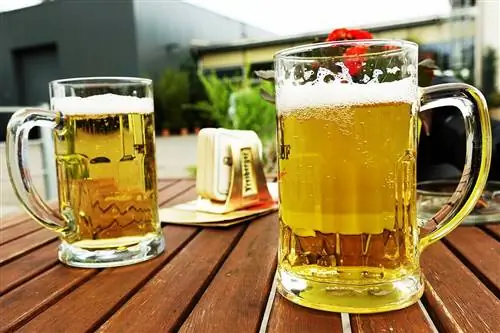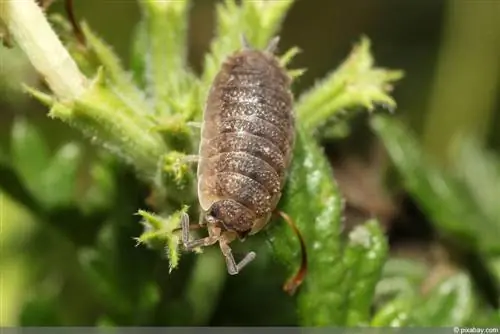- Author admin caroline@plants-knowledge.com.
- Public 2023-12-17 03:39.
- Last modified 2025-01-24 12:45.
Iron is one of the most important minerals that a plant needs for he althy growth. But iron deficiency often occurs due to soil conditions or incorrect fertilization. If the plant shows reduced growth or yellow leaves, action should be taken immediately. Various home remedies also help to supply the plants with enough iron again.
Symptoms of iron deficiency
Plants show typical symptoms that can be traced back to an iron deficiency. As a rule, there is enough iron in fertilizer and soil to prevent a deficiency. However, over-fertilization with nitrates, in soil that is particularly rich in humus, an increase in the pH value to 7.5, for example by watering with very calcareous water, can lead to an iron deficiency in the soil and thus also in the plant. Iron deficiency is recognized by the following symptoms:
- yellow leaves
- characteristic here, the leaf veins remain green
- Mostly young leaves affected
- Growth disorders due to long-term iron deficiency
Tip:
If the iron deficiency is not counteracted when these symptoms are recognized, then in the worst case the plants can die.
Often affected plants
There are definitely plants that get by with little iron and are therefore less likely to be affected by iron deficiency. Other plants, on the other hand, need a lot of iron and therefore show the symptoms of iron deficiency more quickly. These include the following plants:
- Strawberries
- Blackberries
- Raspberries
- Roses
- hydrangeas
- Magnolias
- Rhododendrons and azaleas
- Apple trees
- Peppers
- Tomatoes
Therefore, you should pay attention to a low pH value of 4.5 and therefore an acidic soil for these plants in particular, so that they have enough iron available.
Tip:
Tomatoes are considered heavy feeders. Therefore, they require a particularly high level of all nutrients to ensure a good harvest. However, if tomatoes are grown in mixed cultures with other plants, they can definitely suffer from an iron deficiency due to the heavy consumption of the tomatoes.
Prevent iron deficiency
The best thing is to prevent iron deficiency right from the start. If the plants show the first symptoms of iron deficiency, it is recommended to carry out a soil analysis. In this way, it can be determined whether there is a general iron deficiency or whether the soil has difficulty releasing iron. If there is a general iron deficiency, fertilizer should be applied accordingly. If the plant's iron absorption from the soil needs to be improved, the following measures are suitable:
- loose up compacted soil well
- create a drainage system to prevent waterlogging
- do not use lime-containing irrigation water
- It is better to use collected rainwater for watering
- this prevents the pH value of the soil from increasing
- do not fertilize with nitrates or lime
If the soil is compacted or waterlogged, the plants cannot absorb the iron that is still in the soil. This is because the iron is not water-soluble and the plants have to convert it first. This works best at a pH value of 4.5.
Tip:
Potted plants are often affected by iron deficiency. This is mainly because many nutrients, such as iron, are washed out with the irrigation water. It is therefore advisable to completely replace the soil in the pot once a year, at least every two years.
Use coffee grounds
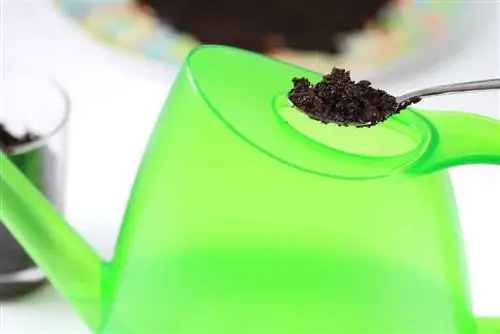
If an iron deficiency has been observed in the plants, various home remedies can be used to replenish iron into the soil. This includes coffee grounds that are mixed into the soil. Coffee drinkers in particular always have this natural fertilizer on hand. Although the coffee grounds do not contain iron, they are slightly acidic and can therefore help to maintain a low pH value in the soil, which in turn promotes iron absorption.
Stale beer
A very good fertilizer is stale beer. Because of the yeast it contains, in addition to the necessary iron, it also contains calcium, sodium, potassium and phosphorus. Beer is therefore not only recommended as a fertilizer if you have an iron deficiency. Fertilizing is done as follows:
- the beer should no longer foam
- so open the bottle
- leave it for one to two days
- mix with water
- Give the affected plant as irrigation water
Tip:
Of course, it is not enough to fertilize the plant affected by iron deficiency just once or twice with a home remedy. This should be given daily over a longer period of time at the beginning and later every two to three days until the plant has recovered. Afterwards, fertilization continues as normal every two to four weeks.
Green Tea
Green tea is not only very he althy for people, but also for plants. This tea contains a lot of iron and is therefore very suitable for the consistent fertilization of raspberries and blackberries. If a plant shows the symptoms of iron deficiency, it should be fertilized with green tea as follows:
- pour and let cool
- dilute with water and water the plant
- If you drink a lot of green tea, you should keep the tea grounds
- this is mixed into the ground
Alum
The grandparents already had alum in the house as a home remedy for all imaginable things. Whether for tanning hides, staining furniture or even stopping bleeding wounds. Alum is available in pharmacies and is now often used by gardening enthusiasts on hydrangeas to color them blue. But alum can also be used as a quick solution to iron deficiency in plants. The procedure is as follows:
- Dissolve powder in water
- pay attention to the manufacturer's instructions for the quantity
- then use to water the affected plants
- repeat every two to three days for several weeks
- then fertilize the plant again as usual
- once she recovers from iron deficiency
Foliar fertilization
Foliar fertilization, together with the home remedies used, can quickly resolve an iron deficiency. However, for foliar fertilization, the special fertilizer must be purchased from a well-stocked specialist store. This means that the iron required is absorbed directly through the leaves. However, the home remedies can still be used as regular fertilizer. However, when it comes to foliar fertilization, you must follow the manufacturer's instructions exactly. Otherwise, the leaves of the affected plants could suffer further damage in the form of burns.

